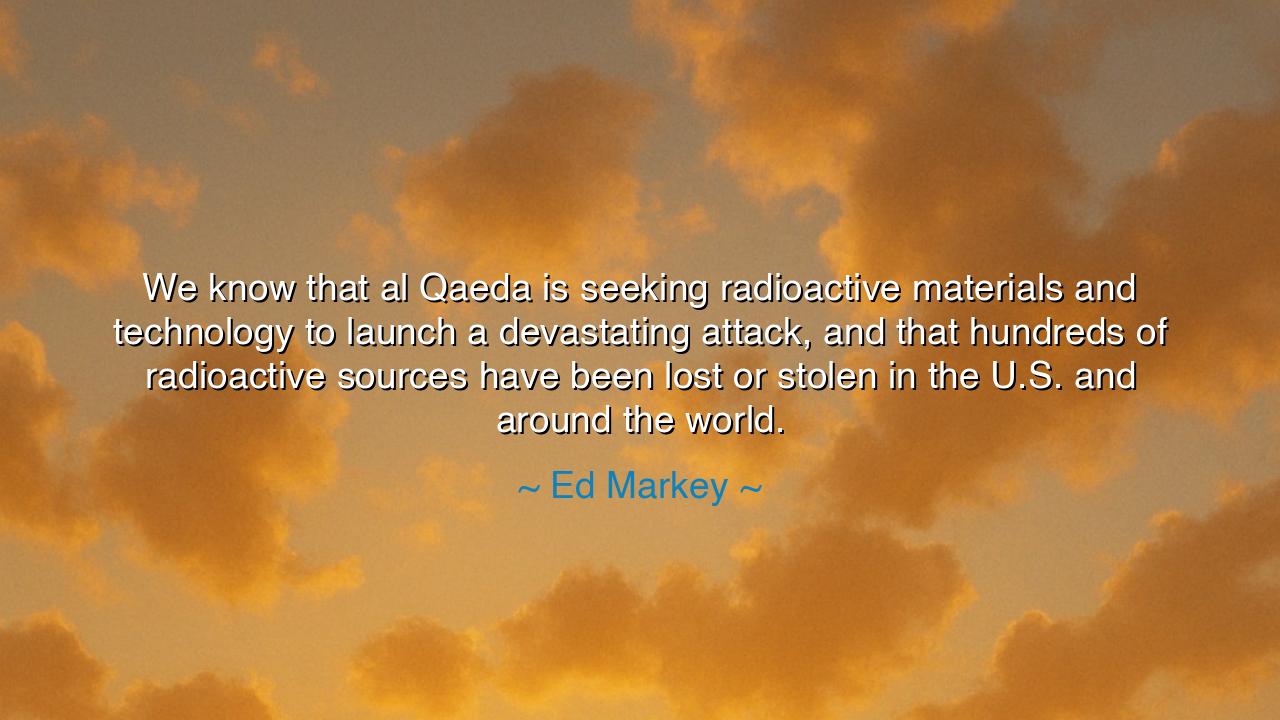
We know that al Qaeda is seeking radioactive materials and
We know that al Qaeda is seeking radioactive materials and technology to launch a devastating attack, and that hundreds of radioactive sources have been lost or stolen in the U.S. and around the world.






Hear the solemn voice of Ed Markey, who spoke not in jest but in warning: “We know that al Qaeda is seeking radioactive materials and technology to launch a devastating attack, and that hundreds of radioactive sources have been lost or stolen in the U.S. and around the world.” This is no idle utterance but the cry of a watchman on the walls, sounding the alarm to a people who slumber. His words are heavy with dread, for they touch the twin forces that shape the destiny of nations—terror and technology, destruction and vigilance.
Markey’s warning arises from the age in which he lived, an era scarred by the memory of towers falling on September 11th, when the world learned that small bands of men, fueled by fury, could shatter empires’ peace. He speaks of al Qaeda, an organization that sought not only blood but spectacle—acts so vast that they could bend the will of nations. To them, the pursuit of radioactive materials was no mere fantasy; it was the search for a weapon of dread, a means to magnify their hatred into catastrophe. In this, Markey unveiled a truth: when wickedness seizes the tools of science, the fruits of progress become the seeds of ruin.
History gives us examples of this peril. Recall the story of the Cold War, when the United States and the Soviet Union amassed arsenals of nuclear fire that could incinerate the earth many times over. The weapons were not used, yet their shadow stretched across every land. Children learned to crouch under desks, nations trembled, and humanity lived always with the fear of one mistake, one miscalculation, that could end all. Here lies the ancient lesson echoed in Markey’s words: power without restraint is peril, and technology without conscience is a curse.
And ponder, too, the tragedy of Chernobyl. Though it was not wrought by malice but by error, its radioactive release poisoned the soil, the air, and the lives of thousands. If mere accident can unleash such suffering, how much greater would be the devastation if such radioactive sources were seized by hands intent on slaughter? Thus Markey’s warning is not exaggeration but prophecy—a reminder that the line between order and chaos is thinner than most dare to believe.
Yet his words are not despair alone. Within them lies the call to vigilance. For though hundreds of radioactive sources have been lost or stolen, mankind is not helpless. Just as the ancients lit watchfires along their walls, so too must we guard the materials of destruction with wisdom and diligence. The guardians of law, the keepers of science, and the ordinary citizens all share in this burden. To grow careless is to invite disaster; to remain alert is to preserve life.
Let the teaching, then, be this: fear not the march of technology, but honor its double edge. When guided by wisdom, it heals the sick, lights the cities, and nourishes the hungry. But when left unguarded, it becomes the very weapon that may undo us. As iron forged into plowshares can also be shaped into swords, so must we choose what becomes of the knowledge we hold.
Therefore, practical actions lie before us. Support the wise stewardship of dangerous materials; demand accountability from leaders and institutions. Learn and teach, so that ignorance does not open the door to catastrophe. And above all, live with the awareness that every gift of science must be matched with the discipline of conscience. Only then will the world move forward in safety, and the dark warnings of Markey will remain as lessons, not as fulfilled prophecy.






AAdministratorAdministrator
Welcome, honored guests. Please leave a comment, we will respond soon